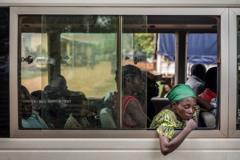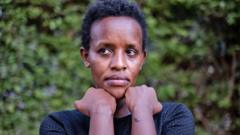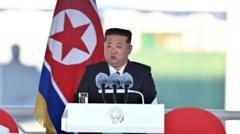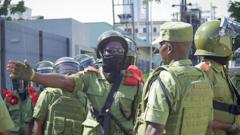The plight of families separated by borders and justice systems has emerged, spotlighting concerns over human rights and legality.
**Venezuelan Families Fear for Their Sons Deported to El Salvador's Mega-Prison**
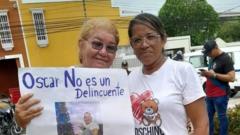
**Venezuelan Families Fear for Their Sons Deported to El Salvador's Mega-Prison**
Venezuelan mothers plead for justice as their children are incarcerated in a notorious prison after US deportations.
Gertrudis Pineda's heartache reflects the despair shared by families affected by the recent deportation of 238 Venezuelans to El Salvador's infamous “Terrorism Confinement Centre,” known for housing gang members. Gertrudis's son, Oscar, who sought a better life in the United States, now faces an uncertain fate behind the prison's daunting walls. "He only wanted the American Dream, but now he’s trapped in a nightmare," she laments.
Living 1,800 kilometers away in Zulia, Venezuela, Gertrudis received the crushing news of Oscar's deportation via a relative in Colombia who spotted his name on a televised list. Formerly employed in Dallas as a carpet layer, Oscar sent money home to support his family, including his diabetic father. Now, Gertrudis grapples with not knowing her son's condition, having only seen troubling images of his arrival at the prison, where he was shorn and shackled.
The United States government claims that the deportees are linked to the Tren de Aragua gang, invoking the controversial 1798 Alien Enemies Act to justify their removal sans due process. While the White House asserts that every deportee was vetted, many lack a documented criminal past. Critics, such as Salvadoran immigration specialist Napoleon Campos, question the constitutionality of this operation, insisting those sent to El Salvador's prison have committed no crimes there.
Activists decry the Cecot as a "black hole of human rights," where mistreatment and inadequate living conditions prevail. As pressure mounts for transparency and justice, Gertrudis has proudly joined demonstrations in Venezuela, calling for the release of those incarcerated on dubious claims of guilt.
Advocacy for the deported Venezuelans includes legal efforts by individuals like Jaime Ortega, who is working to challenge their deportations. He emphasizes the historical parallels of their treatment, likening it to slavery. Ortega urges that, instead of being housed in a prison built for hardened criminals, the men should be relocated to immigration facilities while awaiting their return.
Even as President Nayib Bukele of El Salvador enjoys significant public support for his hardened stance on crime, his measures, including some that suspend constitutional rights, encounter scrutiny. Residents of former gang-controlled neighborhoods express relief over decreased violence, but many acknowledge that innocent people have also been swept into the system during wholesale arrests.
Back in Zulia, Gertrudis continues to care for Oscar's young son, sharing in the grief of Salvadoran mothers whose sons languish without just cause in Cecot. "If they’ve committed any crimes, they should face justice here in Venezuela," she insists through tearful determination. "They must send them home." The situation sheds light on deeper regional tensions and the human toll of policies at the intersection of immigration and crime.
Living 1,800 kilometers away in Zulia, Venezuela, Gertrudis received the crushing news of Oscar's deportation via a relative in Colombia who spotted his name on a televised list. Formerly employed in Dallas as a carpet layer, Oscar sent money home to support his family, including his diabetic father. Now, Gertrudis grapples with not knowing her son's condition, having only seen troubling images of his arrival at the prison, where he was shorn and shackled.
The United States government claims that the deportees are linked to the Tren de Aragua gang, invoking the controversial 1798 Alien Enemies Act to justify their removal sans due process. While the White House asserts that every deportee was vetted, many lack a documented criminal past. Critics, such as Salvadoran immigration specialist Napoleon Campos, question the constitutionality of this operation, insisting those sent to El Salvador's prison have committed no crimes there.
Activists decry the Cecot as a "black hole of human rights," where mistreatment and inadequate living conditions prevail. As pressure mounts for transparency and justice, Gertrudis has proudly joined demonstrations in Venezuela, calling for the release of those incarcerated on dubious claims of guilt.
Advocacy for the deported Venezuelans includes legal efforts by individuals like Jaime Ortega, who is working to challenge their deportations. He emphasizes the historical parallels of their treatment, likening it to slavery. Ortega urges that, instead of being housed in a prison built for hardened criminals, the men should be relocated to immigration facilities while awaiting their return.
Even as President Nayib Bukele of El Salvador enjoys significant public support for his hardened stance on crime, his measures, including some that suspend constitutional rights, encounter scrutiny. Residents of former gang-controlled neighborhoods express relief over decreased violence, but many acknowledge that innocent people have also been swept into the system during wholesale arrests.
Back in Zulia, Gertrudis continues to care for Oscar's young son, sharing in the grief of Salvadoran mothers whose sons languish without just cause in Cecot. "If they’ve committed any crimes, they should face justice here in Venezuela," she insists through tearful determination. "They must send them home." The situation sheds light on deeper regional tensions and the human toll of policies at the intersection of immigration and crime.



